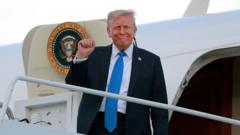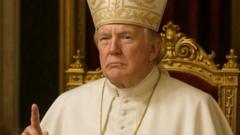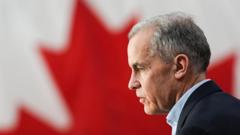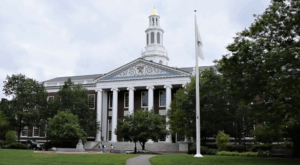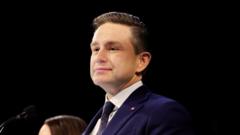The 78-year-old President's statements come as he faces scrutiny over economic policies and immigration actions, while navigating untested legal theories around presidential term limits.
Trump Affirms No Intent for Third Presidential Term Amid Backlash
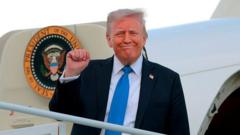
Trump Affirms No Intent for Third Presidential Term Amid Backlash
In a recent interview, Trump insists he is not pursuing a third term, despite past comments suggesting otherwise.
In an exclusive interview on NBC's Meet the Press, President Donald Trump firmly stated that he is not considering a third presidential term, reiterating his commitment to serving two terms as allowed by the US Constitution. Despite previous remarks that hinted at a desire for extended tenure, Trump clarified, "I'll be an eight-year president, I'll be a two-term president," distancing himself from speculation surrounding his potential candidacy for 2028.
The 78-year-old President's statements emerge as his company, The Trump Organization, has reportedly been marketing “Trump 2028” hats, igniting discussions among supporters about his future ambitions in office. Trump acknowledged receiving numerous requests from his followers urging him to contemplate remaining beyond his second term, which concludes in January 2029. "So many people want me to do it," Trump remarked, while also referencing various Republican figures he believes could succeed him.
Underpinning this speculation is the 22nd Amendment of the Constitution, which prohibits any individual from being elected to the presidency more than twice. Amendments to the Constitution require substantial legislative backing, a challenging feat in the current political landscape. Despite this, some of Trump’s backers have proposed that there may be an as-yet-unexamined loophole within these constitutional restrictions.
During the interview, Trump also addressed criticisms of his handling of the economy, asserting that current issues are part of a "transition period” and conveying optimism that America is headed towards a stronger economic future. He remained steadfast in his tariff strategies, which critics argue have impacted global economies and U.S. consumer goods availability.
Addressing questions on immigration policy and the ongoing judiciary processes tied to his administration's actions, Trump expressed confidence in his legal team’s strategy, suggesting that necessary measures are compliant with Supreme Court guidelines. As he gears up to meet Canadian Prime Minister Mark Carney, he dismissed the notion of military action regarding Canada but maintained a tough tone on trade equity.
As the political arena heats up, Trump faces robust challenges across various fronts, from economic policies to immigration reform, leaving observers questioning the broader implications of his recent statements for the Republican party and his future influence within American politics.
The 78-year-old President's statements emerge as his company, The Trump Organization, has reportedly been marketing “Trump 2028” hats, igniting discussions among supporters about his future ambitions in office. Trump acknowledged receiving numerous requests from his followers urging him to contemplate remaining beyond his second term, which concludes in January 2029. "So many people want me to do it," Trump remarked, while also referencing various Republican figures he believes could succeed him.
Underpinning this speculation is the 22nd Amendment of the Constitution, which prohibits any individual from being elected to the presidency more than twice. Amendments to the Constitution require substantial legislative backing, a challenging feat in the current political landscape. Despite this, some of Trump’s backers have proposed that there may be an as-yet-unexamined loophole within these constitutional restrictions.
During the interview, Trump also addressed criticisms of his handling of the economy, asserting that current issues are part of a "transition period” and conveying optimism that America is headed towards a stronger economic future. He remained steadfast in his tariff strategies, which critics argue have impacted global economies and U.S. consumer goods availability.
Addressing questions on immigration policy and the ongoing judiciary processes tied to his administration's actions, Trump expressed confidence in his legal team’s strategy, suggesting that necessary measures are compliant with Supreme Court guidelines. As he gears up to meet Canadian Prime Minister Mark Carney, he dismissed the notion of military action regarding Canada but maintained a tough tone on trade equity.
As the political arena heats up, Trump faces robust challenges across various fronts, from economic policies to immigration reform, leaving observers questioning the broader implications of his recent statements for the Republican party and his future influence within American politics.





